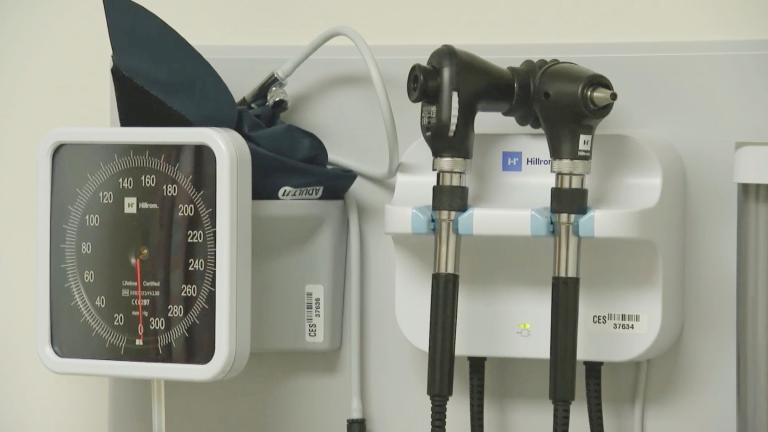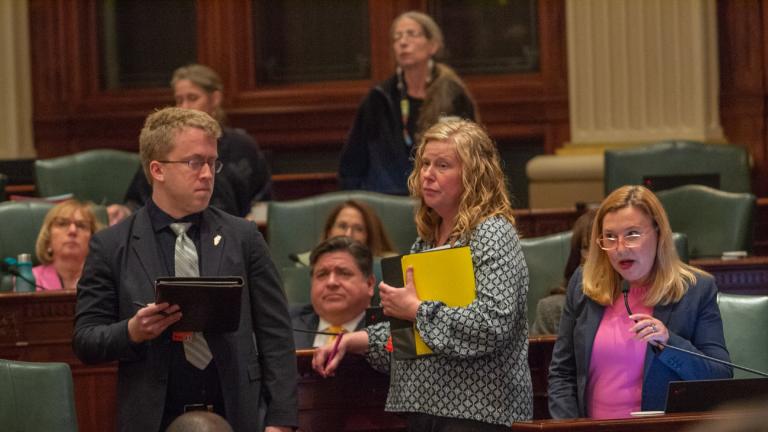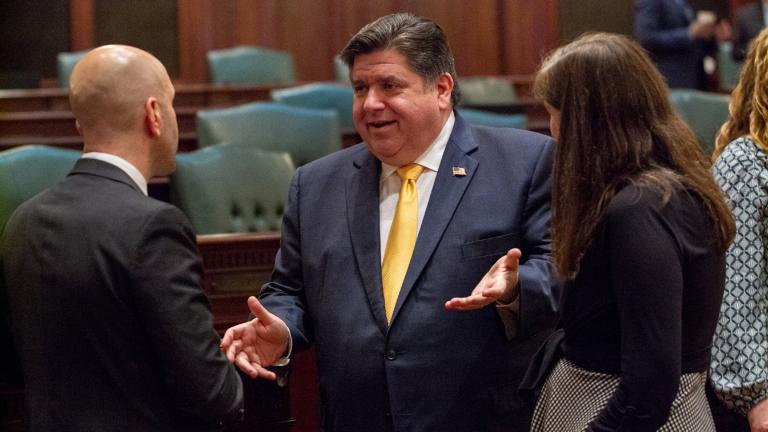 Gov. J.B. Pritzker speaks at a news conference in Springfield on Wednesday before signing an order to rename McFarland Mental Health Center after Elizabeth Packard, a woman who was committed into an Illinois asylum against her will in 1860. (Capitol News Illinois)
Gov. J.B. Pritzker speaks at a news conference in Springfield on Wednesday before signing an order to rename McFarland Mental Health Center after Elizabeth Packard, a woman who was committed into an Illinois asylum against her will in 1860. (Capitol News Illinois)
In June 1860, Elizabeth Parsons Ware Packard was committed to the Illinois Hospital and Asylum for the Insane in Jacksonville by her husband, a Calvinist minister, for, in part, publicly disagreeing with his positions on religion, women’s rights and slavery.
She remained there for more than three years under the care of a psychiatrist who used torturous treatment methods likened to waterboarding, and who collaborated in the imprisonment of women sent to the center even in cases when they were not actually suffering from mental illness.
Now, a state-run mental health center in Springfield – one that for the past 55 years has been named for that psychiatrist, Andrew McFarland – will be renamed in honor of Packard, whose meticulous notes brought much of McFarland’s patient maltreatment to light.
“Today we are putting a spotlight on the real hero associated with this institution,” Gov. J.B. Pritzker said before signing an order Wednesday to change the name of the 120-bed mental health hospital. Packard, he said, is “someone who, in truth, better expresses our proud history of positive reform; someone who changed our world for the better.”
At the time Packard was sent to the asylum, it took little more than a husband’s word to commit a woman – to essentially imprison them – for months or years at a time, even if they showed no signs of mental illness. After her husband, Theophilus Packard Jr., sought her commitment, historical accounts say she was violently forced from her home and put on a train to the facility.
A housewife and mother of six, Packard spent three years inside the hospital in Jacksonville, about 30 miles west of Springfield, a facility that closed in 2012. McFarland oversaw the hospital and perpetuated the lie of her “madness.” He allowed her release in 1863 only after declaring her “incurably insane.”
Instead of breaking Packard, the injustices she endured strengthened her resolve. While confined to the facility, she documented inhumane conditions and patient mistreatment.
For years after her release, she championed the civil rights of people wrongly accused of “insanity” as well as those living with mental illness. She traveled the country telling the story of her wrongful imprisonment and authored several books. In 1867, she successfully lobbied the state legislature to pass a law that afforded people accused of “insanity” the right to a jury trial prior to commitment against their will.
That same year, the legislature set up a commission to investigate Packard’s and others’ claims against McFarland. That commission recommended “an immediate change in the office of Superintendent, and the correction of abuses shown to exist,” according to an account by the Sangamon County Historical Society.
McFarland, however, continued to lead the facility until 1870, when he founded a private asylum.
Despite the legislature’s own commission detailing McFarland’s patient mistreatment, lawmakers nearly 100 years later made McFarland the namesake of the Springfield psychiatric hospital when it opened in 1968.
“With that designation, the state didn't just let Elizabeth down, it let down millions of Americans struggling with their mental health,” Pritzker said Wednesday.
Packard lived until 1897, spending much of her latter years caring for a daughter who had mental illness – and ensuring she was not institutionalized. McFarland died by suicide in 1891.
While several historical accounts have acknowledged Packard’s advocacy, her story gained new life in June 2021 when it was featured in a historical novel by bestselling author Kate Moore, of Cambridge, titled: “The Woman They Could Not Silence: One Woman, Her Incredible Fight for Freedom, and the Men Who Tried to Make Her Disappear.”
At Wednesday’s news conference, Pritzker thanked Moore for her book. He also credited Springfield resident Miranda Bailey-Peetz for launching a petition drive to rename the facility, garnering hundreds of signatures.
In an interview with Capitol News Illinois on Wednesday via Zoom, Moore said the idea for the book came from the #MeToo movement. She wanted to explore the idea that women have historically been “silenced through the false claim that we’re crazy.” In searching for a heroine for her book on the internet, she stumbled upon a passage about Packard in a University of Wisconsin essay about lunacy in the 19th century.
“And when I started looking into her story, I was like, ‘wow, she is the one,’” Moore said, adding that she learned through extensive research that Packard was fearless in her pursuits to help others but also incredibly modest. Packard may not have personally sought to have her name emblazoned on a building, Moore surmised, but she would have been “delighted” to see McFarland’s name removed and that “the truth is finally coming out.”
“I think she would be personally grateful that she and her work have been recognized when, so much of her life, she was denigrated and dumbed down. I think you would have to take pleasure in that feeling of respect being shown to what you've dedicated your life to,” Moore said. “But I also think she would say the work is not done.”
Capitol News Illinois is a nonprofit, nonpartisan news service covering state government. It is distributed to hundreds of print and broadcast outlets statewide. It is funded primarily by the Illinois Press Foundation and the Robert R. McCormick Foundation, along with major contributions from the Illinois Broadcasters Foundation and Southern Illinois Editorial Association.








